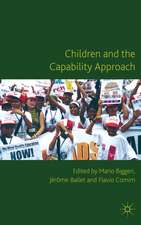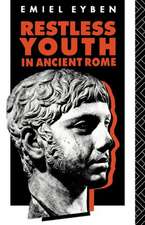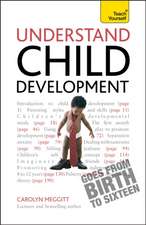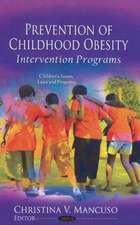Governing the Child in the New Millennium
Autor Kenneth Hultqvist, Gunilla Dahlbergen Limba Engleză Hardback – 6 apr 2001
| Toate formatele și edițiile | Preț | Express |
|---|---|---|
| Paperback (1) | 348.02 lei 6-8 săpt. | |
| Taylor & Francis – 3 apr 2001 | 348.02 lei 6-8 săpt. | |
| Hardback (1) | 703.90 lei 6-8 săpt. | |
| Taylor & Francis – 6 apr 2001 | 703.90 lei 6-8 săpt. |
Preț: 703.90 lei
Preț vechi: 828.11 lei
-15% Nou
Puncte Express: 1056
Preț estimativ în valută:
134.70€ • 144.03$ • 112.30£
134.70€ • 144.03$ • 112.30£
Carte tipărită la comandă
Livrare economică 17 aprilie-01 mai
Preluare comenzi: 021 569.72.76
Specificații
ISBN-13: 9780415928304
ISBN-10: 0415928303
Pagini: 308
Dimensiuni: 152 x 229 x 26 mm
Greutate: 0.61 kg
Ediția:1
Editura: Taylor & Francis
Colecția Routledge
Locul publicării:Oxford, United Kingdom
ISBN-10: 0415928303
Pagini: 308
Dimensiuni: 152 x 229 x 26 mm
Greutate: 0.61 kg
Ediția:1
Editura: Taylor & Francis
Colecția Routledge
Locul publicării:Oxford, United Kingdom
Notă biografică
Kenneth Hultqvist and Gunilla Dahlberg are Lecturers at the Stockholm Institute of Education.
Recenzii
"Foucault writes that the aim of his work is 'to think differently, instead of legitimating what is already known.' Hultqvist and Dahlberg have brought together a set of international researchers who surely know what this means! The young will not be thought of conventionally and naturally again. Each chapter is a rare treat in an era of often-indiscriminate use of Foucault." -- Lynda Stone, Professor, University of North Carolina at Chapel Hill
"I welcome this collection as an exciting range of essays addressing the discursive practices that make childhood and the figure of the child appear. This provocative work invites one into the detail of the shifting government of the child at a variety of sites and encourages a nuanced exploration of the cultural and political processes that surround and inform that government. A fresh and ambitious book!" -- Vikki Bell, Senior Lecturer, Goldsmiths College, University of London
"This book is the first serious attempt to engage with the important changes in the ways in which children are understood and regulated as we enter a new millennium. This collection goes a long way in placing the study of childhood where it belongs-at the very heart of the analysis of the present." -- Nikolar Rose, Professor of Sociology, Goldsmiths College, University of London
"I welcome this collection as an exciting range of essays addressing the discursive practices that make childhood and the figure of the child appear. This provocative work invites one into the detail of the shifting government of the child at a variety of sites and encourages a nuanced exploration of the cultural and political processes that surround and inform that government. A fresh and ambitious book!" -- Vikki Bell, Senior Lecturer, Goldsmiths College, University of London
"This book is the first serious attempt to engage with the important changes in the ways in which children are understood and regulated as we enter a new millennium. This collection goes a long way in placing the study of childhood where it belongs-at the very heart of the analysis of the present." -- Nikolar Rose, Professor of Sociology, Goldsmiths College, University of London
Cuprins
Preface Chapter 1. Governing the child in the new millennium Kenneth Hultqvist and Gunilla Dahlberg Chapter 2. Safety and danger: Childhood, Sexuality, and Space at the end of the millennium Valerie Walkerdine Chapter 3. Time Matters in Adolescence Nancy Lesko Chapter 4. The Pacing and Timing of Children's Bodies Chris Jenks Chapter 5. Administering Freedom. A History of the Present-Rescuing Parents to Rescue the Child for Society Tom S. Popkewitz and Marianne Bloch Chapter 6. Educating Flexible Souls: The construction of Subjectivity through Developmentality and Interactionism Lynn Fendler Chapter 7. Bringing the Gods and the Angels Back? A modern pedagogical saga about excess in moderation Kenneth Hultqvist Chapter 8. Childhood, School and Family. Continuity and displacement in recent researchers Mirian Warde Chapter 9. Childhood and the Politics of Memory in Argentina Ines Dussel Chapter 10. Construction of the Child in Mexican Legislative Discourse Rosa Nidia Buenfil Chapter 11. When post-structuralism meets Gender Julie McLeod
Descriere
The contributors and editors of this volume begin from the assumption that the changes wrought by globalization compel us to reflect upon the status of the child and childhood at the end of the 20th century. Their essays consider what techniques and technologies are used to govern the child, what role the family plays, what is global and what is culturally specific in the changes, and how the subject is constructed and construed.

























